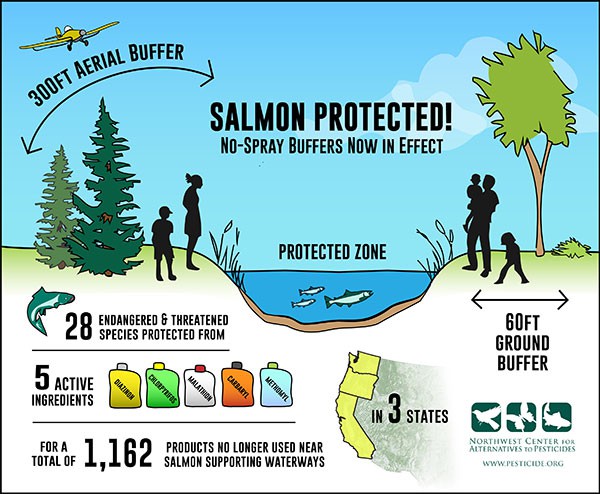Northwest Center for Alternatives to Pesticides (NCAP)
wants 300 foot buffer for aerial spraying,
not part of 2020 environmentalist / timber agreement
 NCAP was founded in large part to stop aerial spraying and ultimately succeeded in stopping spraying of federal forests. But the staff who helped achieve that are long gone from the organization. More recently they have only advocated for token, unenforceable buffers, not pollution prevention.
NCAP was founded in large part to stop aerial spraying and ultimately succeeded in stopping spraying of federal forests. But the staff who helped achieve that are long gone from the organization. More recently they have only advocated for token, unenforceable buffers, not pollution prevention.
In 2017, I had a conversation with Kim Leval, then Executive Director of NCAP about their unwillingness to promote pollution prevention. Her husband, Lane County Commissioner Peter Sorenseon, listened while we talked. About a month later, I encountered Commissioner Sorenson at the U of Oregon law school's Public Interest Environmental Law Conference and he asked me "who is paying you to attack NCAP?"
Sorenson's statement was especially shocking since he knows I spent years of volunteer time to help stop the West Eugene Porkway. (I met with him early on in my involvement in that successful effort. He offered to help technically, referencing his involvement in the failed effort to stop the Bend Porkway. Sorenson voted against County participation in the WEP, but I am unaware of technical assistance provided to help persuade ODOT and Federal Highway to select "No Build.")
In January 2020, NCAP had a booth at the Good Earth Home Show. Their staff stated then they do not (yet?) advocate for ending aerial spraying but will "soon" have a "strategy" meeting to discuss options, a position they have had for years.
NCAP was not part of the anemic ballot initiative process led by Oregon Wild and Beyond Toxics in 2019, so was not part of the 2020 "Memorandum of Understanding" that saw those groups and others cave in to the timber companies.
If you want to ask NCAP why they do not advocate for an end to aerial spraying, contact:
ASHLEY CHESSER
EXECUTIVE DIRECTOR
541-344-5044, ext. 27
achesser@pesticide.org